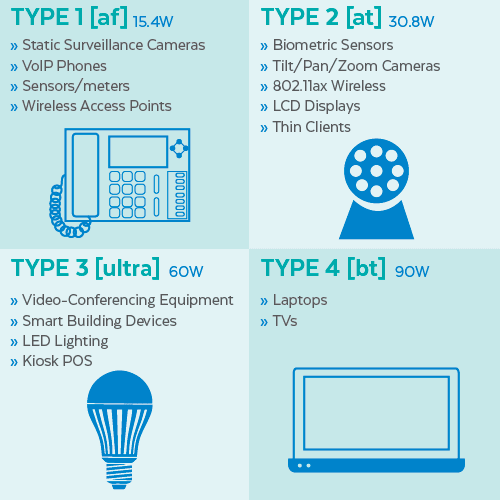
 POE Switches
(60)
POE Switches
(60)
 CCTV Power Supplies
(82)
CCTV Power Supplies
(82)
 Video Baluns
(39)
Video Baluns
(39)
 CCTV Connectors
(74)
CCTV Connectors
(74)
 CCTV Testers
(19)
CCTV Testers
(19)
 CCTV Tools
(17)
CCTV Tools
(17)
 CCTV Cables
(15)
CCTV Cables
(15)
 CCTV Microphones
(33)
CCTV Microphones
(33)
 Ethernet Switch
(18)
Ethernet Switch
(18)
 Video Converters
(3)
Video Converters
(3)
 Video Extenders
(4)
Video Extenders
(4)
 IP Extenders
(3)
IP Extenders
(3)
By Rita Mailheau, Source: versatek.com
The difference between an injector and a splitter is that a PoE injector sends power to PoE equipment that receives data through existing non-POE switches. A splitter also supplies power, but it does so by splitting the power from the data and feeding it to a separate input that a non-PoE compliant device can use.
Power over Ethernet (POE) technology sends 10/100/1000 Mbps of data and 15W, 30W, 60W, and up to 90W of power budget to devices over Cat5e and Cat6 Ethernet cables for a maximum distance of 100m.

A POE injector, a device also commonly known as a “midspan,” introduces or injects power onto an Ethernet cable. The injector adds power to data that is coming from a non-PoE switch or “endspan.” It has an external power supply.
Injectors allow admins to populate and properly support LANs with both compliant and noncompliant devices.

A splitter, another frequently used power device, goes in the opposite direction of the Injector. It has two output cables: one supplies data and the other power. It is used to deploy remote non-PoE devices with no nearby AC outlets.
A splitter allows a non-compliant device to upgrade to POE. By plugging into the network connection, it can pull power, and convert it into low-voltage ranges as required.
A power budget is the total amount of power a device can send through an Ethernet cable.
Both the injector and the splitter deliver power according to each of the 4 types of power. Check manufacturer specifications. The newer the device is to the PoE product list, the higher the level of power will most likely be needed. Type 3 is the current mainstream. Type 4 products are emerging fast.
| Levels of Power | IEEE Standard | Watts Supplied |
| Type 1 | IEEE 802.3af | Up to 15.4W |
| Type 2 | IEEE 802.3at | Up to 30.8W |
| Type 3 | Ultra PoE / 802.3bt | Up to 60W |
| Type 4 | IEEE 802.3bt | Up to 90W |
That means a power budget of 90W and the capability to support the newest generation of devices.
 The right injector or splitter for your job will be clearly indicated by the IEEE 802.3 extension provided by the manufacturer: .af, .at, Poe Ultra, and .bt.
The right injector or splitter for your job will be clearly indicated by the IEEE 802.3 extension provided by the manufacturer: .af, .at, Poe Ultra, and .bt.
First and foremost the PoE injectors and splitters save money by allowing IT pros to combine legacy devices with newer, more efficient PoE networking components.
They also allow organizations to add remote devices without having to install electrical infrastructure. Injectors and splitters are designed to provide power to and from non-PoE compliant equipment.
These inexpensive units will add years to a legacy system and can literally save thousands of dollars by bypassing the installation electrical outlets in remote locations.